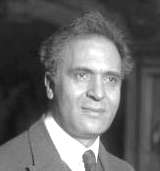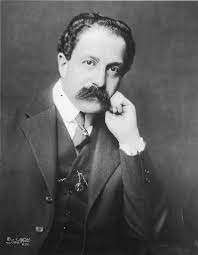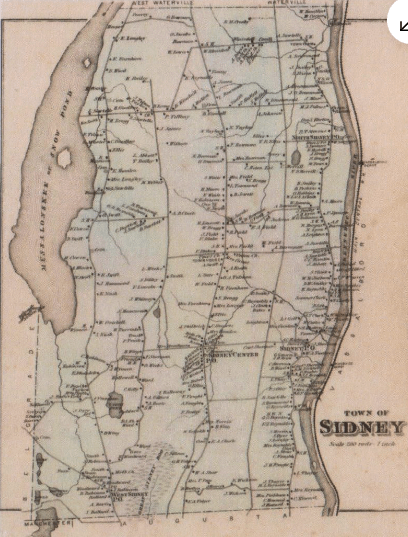
Sidney, 1879
The Faughts were another early Sidney family. The first Faught your writer came across was Marlborough Packard Faught, a name that sounded refreshingly unusual; but she soon found that the Faughts, like the Bacons, enjoyed repeating more common names – Frederick, Jacob, Samuel – through generations.
Alice Hammond wrote in her history of Sidney that the Faughts “were active in community affairs on both sides of the Kennebec River [in Vassalboro and Sidney].”
She gave no details from early history, nor did Alma Pierce Robbins, in her Vassalboro history (Sidney was part of Vassalboro until it became a separate town on Jan. 30, 1792). Henry Kingsbury, in his history of Kennebec County, included no Faughts on his lists of town officials.
(Hammond mentioned two 1915 events: George Faught, a Boston tailor, died that year and left money to the town “for the benefit of the school at or near Bacon’s Corner”; and on July 31, Florence Faught was chosen first Grand Matron of White Rose Chapter, No. 174, of the Order of the Eastern Star.
(Hammond said in 1992 the school fund had $3,000, from which interest could be used for students at Sidney’s only elementary school, James H. Bean School, on Middle Road. White Rose Chapter is no longer on the Maine list of Eastern Star chapters.)
Kingsbury named three Faughts, Anthony, Frederick and Jacob, as early settlers.
If your writer has found the right family, these were sons of a German named Philip Faught and his unidentified wife. Kingsbury wrote that Philip emigrated to Boston in 1751 and moved to Dresden, on the Kennebec below Augusta, in 1756.
Philip Faught’s sons are listed on Familysearch as Philip (1744 – 1772 or later); Frederick (1746 – 1814); Jacob (1750 – 1830) and Anthony (1752 – 1830). This site says all four Faught boys were born in Germany, despite Anthony’s birthdate the year after the family supposedly came to America.
* * * * * *
Philip, born in 1744, married a woman named Hannah and was identified as “of Vassalboro” at his death sometime after 1772. Your writer found no other information.
* * * * * *
Frederick, born around 1746, “came to America with the family and settled on the Kennebec in Sidney, where he spent the rest of his life,” Kingsbury wrote. (Presumably Frederick moved to Sidney later in his life, not in 1751 when he was about five years old.) He died April 1, 1814, and is one of many Faughts buried in Sidney’s Sibley cemetery, on West River Road, near the Augusta line.
On Oct. 31, 1775, Frederick married Thankful Durant (1751 – 1834), in Hallowell. Between 1779 and 1793, Familysearch says, Frederick and Thankful had at least four sons, Philip (again), Frederick (again), Jacob (again) and Samuel, and three daughters.
At least one early Faught settled toward the south end of the river road. Another settled on the middle road (west of and paralleling the river road) a mile south of Bacon’s Corner. Kingsbury mentioned two Faught farms, and said one was among several in Sidney with clay suitable for brick-making.
Frederick and Thankful’s four sons spent their lives in Sidney, continuing the family name. Philip (Nov. 7, 1783 – Dec. 31, 1855) married Anna Pinkham (born in 1788) on December 3, 1812, in Sidney; the couple had at least one son, whom they named Theodore (1818 – 1861), and one daughter, Mary Ann (1819 – 1910).
The second Frederick (Feb. 17, 1786 – April 16, 1861) married Susanna Packard (1796 – 1879), in Sidney. She was the daughter of Marlborough Packard, of Union, Massachusetts. Their six sons and two daughters, born between 1818 and 1836 and representing the third generation, in Sidney, started with Marlboro Packard Faught (1818 – April 17, 1890), named after his maternal grandfather.
The next boy, born in 1821, was Frederic (without the final k, apparently), named for his father and paternal grandfather. The other children were named Caroline P. (1825), Luther R. (1828), Lemuel Porter (1830), Albert (1832), George N. (1834) and Frances Ann (1836).
Frederick and Thankful’s third son, Jacob (May 12, 1788 – Nov. 9, 1828), is listed as born in Augusta, but he and Sarah Reynolds (1795 – 1871) were marred July 9, 1818, in Sidney; their daughters Nancy, Lithia and Bethia or Bethiah and sons Jacob and Samuel, Jr., were born in Sidney between 1819 and 1826; and Jacob and Sarah both died in Sidney and are buried in the Sibley cemetery.
The youngest of this generation of Faughts, Samuel, is also listed as born in Augusta, on April 13 or 14, 1793 (Familysearch and Find a Grave disagree by a day). He married Susan M. Boyd, born in 1796 or 1797. They had two or three children, more third-generation Sidney Faughts.
The two sources agree their oldest was Tryphosa French, born in 1823. She married her cousin, Frederick and Susanna’s son Marlboro Packard Faught (1818 – 1890). Find a Grave records no children of this marriage; Familysearch lists, without details, sons Freddy B., born in 1855, and Henry M., born in 1857.
Tryphosa’s younger brother, Jacob Henry Faught, was born Nov. 11, 1829, in Sidney. He married another Sidney resident, Jane F. Reynolds (born April 11, 1835) on Jan. 9, 1861, Familysearch says in Portsmouth, New Hampshire. This site says Jane was living in Sidney in 1850, 1860 and 1880; she died in Middlesex, Massachusetts, May 26, 1923, and is buried in Sibley cemetery with her husband, who died June 25, 1882.
Find a Grave says Jacob and Jane had a daughter, born Oct. 4, 1861, whom they named L’Orient Bemis Faught. L’Orient married a man named Thayer; she died in 1939, and she and her husband are buried in Connecticut. Familysearch adds two more daughters, Nellie A., born in 1868, and Jennie H., born in 1873.
Samuel and Susan had a third child, a son they named Samuel Faught, Jr, according to Find a Grave. His birthdate and history are unknown; he died Sept. 11, 1851 (probably in his 20s), and is buried in Sibley cemetery.
Susan Boyd Faught died Sept. 7, 1877; Samuel died Nov. 26, 1889, age 96. Find a Grave says both are buried in Sibley cemetery.
Thankful (Mrs. Frederick) Faught, mother or grandmother of the numerous Faughts just listed, is the only Faught Kingsbury named as involved in a community activity. When Sidney’s second Baptist church was organized Feb. 7, 1806, he wrote, the 17 initial members included Thankful Faught.
* * * * * *
Jacob, German emigrant Philip and his unknown wife’s third son, born about 1750, was a Vassalboro resident from the 1790 through 1830 censuses, Familysearch says. The website says he married Hannah Sedgley, born, in Bowdoinham, in 1752, on June 9, 1772, and between 1773 and 1796 the couple had two sons and 10 daughters. Burials that Find a Grave lists in Vassalboro’s Faught cemetery include Jacob and Hannah, without dates.
* * * * * *
Philip’s youngest son, Anthony, was born about 1752 (a conflict with the 1751 emigration date). Kingsbury posed another puzzle when he referred to him first in 1791 and wrote that he left Germany “to avoid service in the army,” which would not have been a problem for an infant. (Either your writer is conflating two Anthony Faughts, or this Anthony did not join his brothers in America until he was a young man.)
Familysearch says Anthony married Hannah Durant (or Durent; born in 1755), in Vassalboro, in April or May 1778. They had at least three sons and two daughters between 1780 and 1797. The website says Hannah was the younger sister of Anthony’s older brother Frederick’s wife Thankful.
Familysearch says Anthony lived in Vassalboro “for about 12 years and Sidney…for about 10 years.” He died in Sidney sometime after 1830.
Hammond and Kingsbury agreed that in 1791, Anthony Faught became the third owner of a lot granted in 1763 to Levi Powers, on the west side of the river road, not far north of the Augusta line. (See box.)
The Faughts and the Levi Powers House
The important point about Anthony Faught buying the land originally granted to Levi Powers, according to Alice Hammond and to Frank Beard and Robert Bradley, of the Maine Historic Preservation Commission, is that the Faught family thereby acquired, and held onto until the late 1920s, the Levi Powers House.
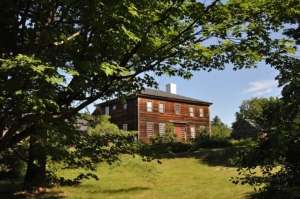
Levi Powers House, in Sidney.
This house is now on the Register of Historic Places in Maine, one of two historic properties in Sidney. (The other is Tiffany Hill Chapel, which your writer described in the Aug. 19, 2021, issue of The Town Line.)
Hammond wrote that staying in the same family for so long “may help to explain why the home retains so many of its original features and why the original grant and the deed showing Anthony Faught’s purchase of lot 37 remain in the home.”
In their 1979 application for historic register listing, Beard and Bradley called the building a “remarkably preserved Colonial house [that] is of particular importance because of size and fineness of proportion in the context of a newly settled area. It remains little changed either externally or internally and better than most conveys an accurate impression of its time and place.”
Levi Powers got his grant from the Kennebec Proprietors in 1763, Hammond wrote. He acquired “a little over 100 acres on the [Kennebec] river and about 150 acres in the third tier of land,” a couple miles farther west.
Beard and Bradley assumed he had to clear a lot of forested land before he could build his “large and substantial” house. They date the house from around 1700.
The Powers house is a two-story post-and-beam building, facing east, with a fieldstone foundation and internal chimneys near the north and south ends. The main entrance in the middle of the front façade opens into the central hall; the front is five bays wide, the north and south sides three bays. There is a one-story ell on the south side.
Inside, the historians commented on “common pineapple stencilling in deteriorated condition in the front hall,” probably from the 1830s, and the “extensive and finely detailed wood graining in the kitchen and dining room.” Hammond attributed the stencils to Moses Eaton (Moses Eaton and his son, Moses Eaton, Jr., were famous New Hampshire-based folk artists in the early 1800s).
Beard and Bradley wrote: “It is difficult to escape the conclusion that Powers may well have been influenced in designing the house by the nearby Pownalboro Court House…, so similar are the proportions, roof pitch and framing of the two buildings.”
Hammond said Powers sold his house on Oct. 31, 1778, to Jethro Gardner, who on Dec. 23, 1782, sold it to Anthony Faught for 800 pounds.
On July 15, 1818, Hammond found, Anthony sold the house to John and Elijah Faught (presumably his youngest sons), for $2,000. (An online source says the United States dollar replaced the British pound and other currencies in 1792.)
Hammond continued to track sales within the Faught family until 1928, when “the farm” went to Civil War veteran Simon C. Hastings (1843 – 1948), who was probably the widower of Ellen Hannah Faught (1845 -1912) (two more Faughts who are buried in Sidney’s Sibley cemetery).
Hammond wrote that Hastings auctioned off the house contents and burned the unsold furniture. He sold the house in 1929; it passed through several owners before William and Charlotte Sawtelle acquired it in 1977. Hammond wrote that in 1992, the Sawtelles were still “working to preserve the historical integrity of the house.”
Main sources
Beard, Frank A., and Robert L. Bradley, National Register of Historic Places Inventory – Nomination Form, Powers House July 1979.
Hammond, Alice, History of Sidney Maine 1792-1992 (1992).
Kingsbury, Henry D., ed., Illustrated History of Kennebec County Maine 1625-1892 (1892).
 by Mary Grow
by Mary Grow

 by The Town Line staff
by The Town Line staff


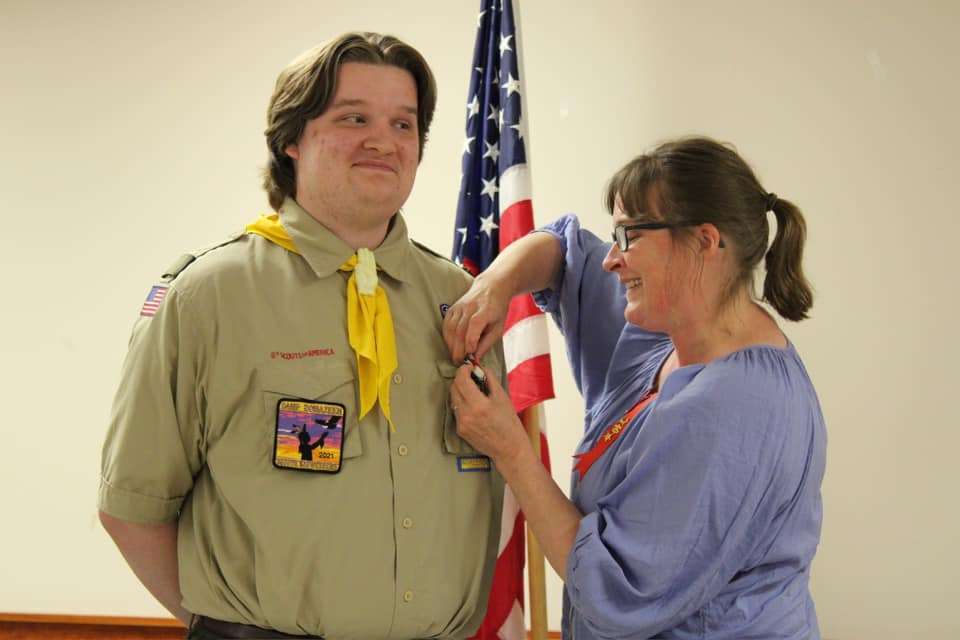
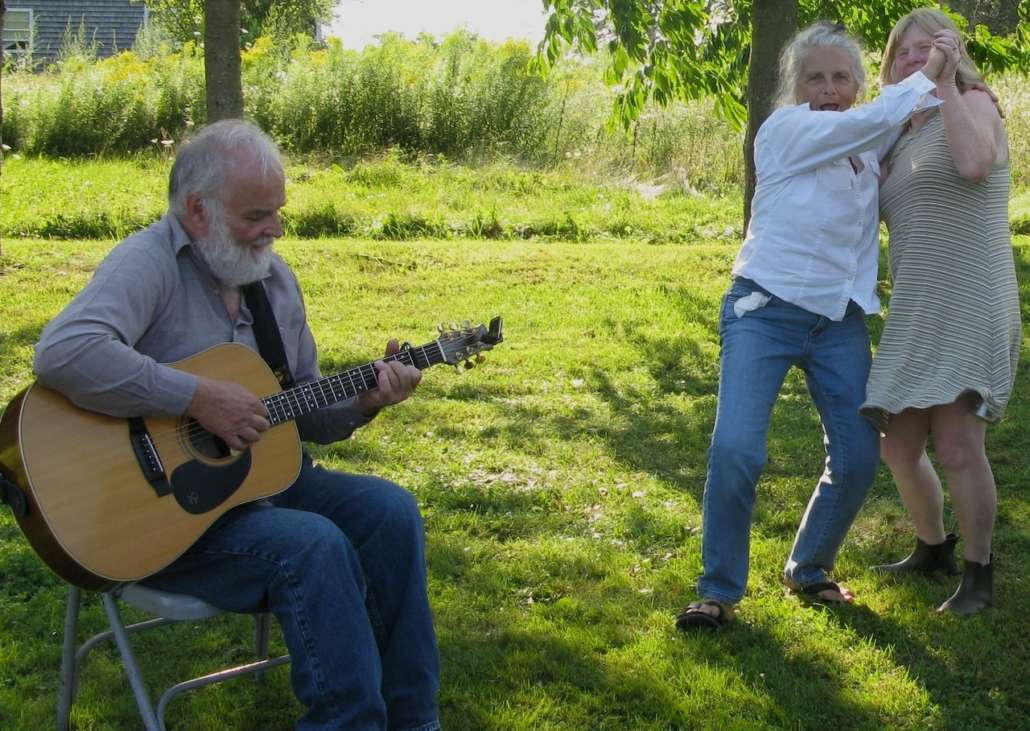


























 Western New England University (WNE), in Springfield, Massachusetts, recognizes the outstanding academic achievements of two area students named to the president’s list for the Spring 2024 semester.
Western New England University (WNE), in Springfield, Massachusetts, recognizes the outstanding academic achievements of two area students named to the president’s list for the Spring 2024 semester.
